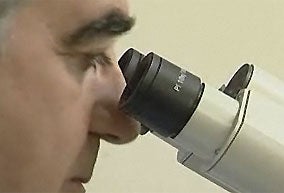Coroners 'should order tests for vCJD'

Your support helps us to tell the story
From reproductive rights to climate change to Big Tech, The Independent is on the ground when the story is developing. Whether it's investigating the financials of Elon Musk's pro-Trump PAC or producing our latest documentary, 'The A Word', which shines a light on the American women fighting for reproductive rights, we know how important it is to parse out the facts from the messaging.
At such a critical moment in US history, we need reporters on the ground. Your donation allows us to keep sending journalists to speak to both sides of the story.
The Independent is trusted by Americans across the entire political spectrum. And unlike many other quality news outlets, we choose not to lock Americans out of our reporting and analysis with paywalls. We believe quality journalism should be available to everyone, paid for by those who can afford it.
Your support makes all the difference.Coroners are refusing to carry out post-mortem tests for an infection which causes the human form of BSE despite pleas that they could help monitor the spread of the disease, it was reported today.
Professor John Collinge, a leading expert on variant Creutzfeldt-Jakob Disease (vCJD) warned that many people could be "silently infected" with the potentially fatal condition.
The body responsible for advising ministers on the issue - the Spongiform Encepalopathy Advisory Committee (SEAC) - told the Government two years ago that it was important to find out how many people were carrying the infection, the BBC said.
The only reliable way of doing that, they said, would be to ask coroners to test the brain and spleen of young people during post-mortem examinations so that they could be tested for the presence of the infectious agent - known as a prion.
Prof Collinge, a member of SEAC, said systematic testing was needed to establish how many more people were likely to get the disease and whether the current measures to protect the spread of infection through blood transfusion and surgery were appropriate.
He told BBC Radio 4's Today programme: "There is a concern that what we have seen so far may be the first wave occurring in individuals who are particularly genetically susceptible but there may be more people who are silently infected in the community than the number of clinical cases we have seen would suggest."
He urged coroners to request the test when ordering post-mortem examinations.
"I would hope that they would be able to help with this because I don't see any other way for us to get this information at the moment," he said.
Only 164 people have died of the disease but scientists admit there is no accurate indication of how many people may be carrying it.
Professor Graham Medley, another member of SEAC, said the group's role was to advise on risk assessment.
He told the programme: "We have been very vocal in terms of saying these data are absolutely vital if we really want to manage the process properly.
"My understanding is the Department of Health is very keen to push this forward, it's really just using coroners as an opportunity to do some sampling.
"I'm not sure why there has been some apparent reluctance on behalf of coroners."
Dr Michael Powers QC, an expert in coronial law, said coroners would be happy to order the test if the Government changed the law.
He told Today that at present they are able to order a post-mortem examination only to find the cause of death, and not test for other infections which may have been present.
Dr Powers said: "This is a function which is outside the coroners' statutory authority.
"Because they are not, those tests, directed to ascertaining the death in an individual case."
The Coroners and Justice Bill going through Parliament could be altered to put a duty on coroners to order the test, he said.
"That would completely solve the problem," he said.
Christine Lord, whose son Andy Black died of vCJD, told Today: "This is a public health issue. I, as a mum, have lost a child, a very dear, loved child, through an avoidable disease.
"The coroners, by actually blocking this, are actually not protecting public health.
"They just seem to be protecting their particular role in Government.
"At the end of the day, they are public servants and their job is to protect us."
A Department of Health spokesman said a pilot to obtain tissue samples from post-mortem examinations with the co-operation of some coroners will take place later this year.
"It is important to obtain a better understanding of the prevalence of vCJD so that we can prevent secondary transmission from person to person," the spokesman said.
"The Government's independent scientific advisory group on CJD, the Spongiform Encephalopathy Advisory Group (SEAC), has recommended that studies of tissues, such as spleen, collected at post-mortem would provide important data on the prevalence of vCJD infection in the population.
"The Health Protection Agency is running the pilot with the cooperation of NHS Bereavement Services and NHS Blood and Transplant's consent team.
"Some coroners have agreed to participate in the pilot study and appropriate funding will be made to them and to the other organisations incurring additional costs."
Join our commenting forum
Join thought-provoking conversations, follow other Independent readers and see their replies
Comments